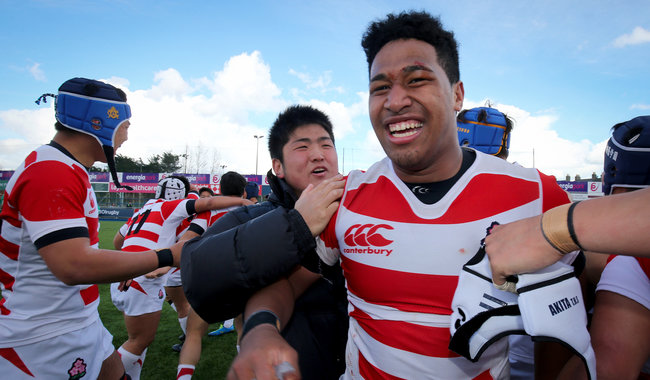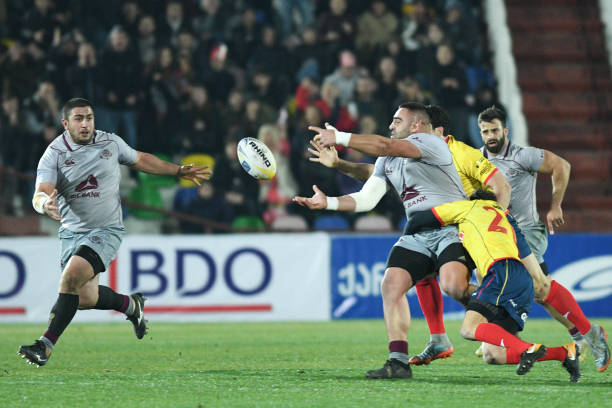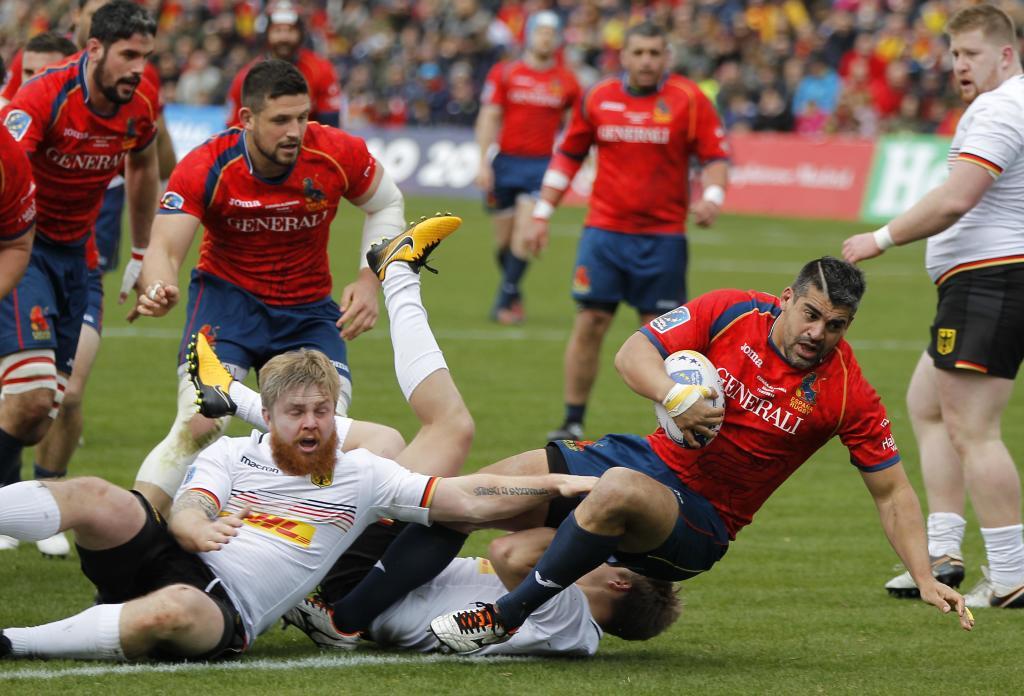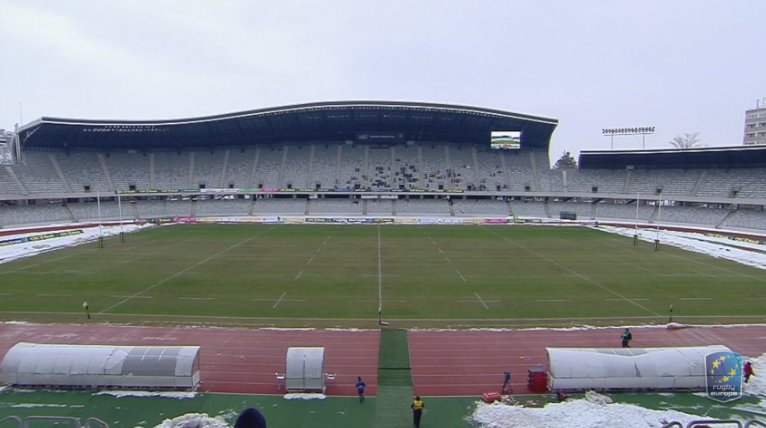Japan and Tongan rugby has been linked together for around 40 years. The origin story began in 1976 when Toshio Nakano, a visiting teacher from Daito Bunka University and also manager of its rugby team, introduced Japanese abacus (soroban) skills to King Taufa'ahau Tupou IV of Tonga. Apparently the late King was impressed and a friendship formed which led to Tongans going to study the abacus with Nakano on rugby scholarships.
In the mid 1980's three of the players who were amongst the earliest students to go and study at Daito Bunka University (Nofomuli Taumoefolau, Hopoi Taione, and Sinali Latu) became the first Tongans to play for Japan. Taumoefolau and Latu (both of whom also represented Tonga) went onto play in the inaugural World Cup in 1987 and were also part of the Japan team that recorded a first ever win over Tier 1 opposition against Scotland in 1989. All three of those players still live in Japan today and Latu's son has just this week signed for the leading Top League team the Panasonic Wild Knights.
A handful more would follow their path into the Japan team in the ensuing years. In the 1990's there was Sione Latu and Lopeti Oto. In the early to mid 2000's Luatangi Vatuvei and Touriki Mau. All of whom went from Tonga to Daito Bunka University. Various others of course did not reach national team level but went onto have Top League careers.
Eventually the contacts grew and Tongans spread across the country to various different Universities, with some also starting to move to Japan much younger whilst still only aged around only 15 or 16.
The first of these to represent Japan (Christian Loamanu, Katoni Otukolo, and Ryu Koliniasi Holani) were all players who moved to Shochi Fukaya High School and then onto Saitama Institute of Technology (which is also now where Taumoefolau now coaches). Loamanu became the first ever 18 year old to play for the Brave Blossoms in 2005, whilst Holani (also the nephew of Taumoefolau) made his debut three years later going onto win 44 caps and remains the most capped Tongan to play for Japan.
Tongans have been present in Japanese rugby for more than 30 years. Reportedly now after such a length of time there is now a wider network of contacts and support making it easier for the students. Most are very well integrated and far more fluent in the language compared to a lot of the New Zealand born players in Japan. Quite a few of the past players to have come from Tonga to Japan have married and settled there after their playing career has finished.
However over the last 2 or 3 years there has been a very noticeable new surge of Tongan talent coming through the ranks. In total 21 players have moved from Tonga to High School or University in Japan and gone on to represent the Brave Blossoms since Taumoefolau was the first 33 years ago in 1985. Of those 21 players, 10 have featured over just the past two years since the last World Cup, with 8 of them making their debut in either 2016 or 2017.
Presently only one of those Tongans is an established first choice starter. Amanaki Mafi, who burst onto the scene in late 2014 and since become widely regarded as one of the leading players in Super Rugby for the Melbourne Rebels. However there will almost surely be more by the time of the 2023 World Cup.
In March watching Junior Japan score notable wins over Tonga A and Samoa A in the Pacific Challenge, three of their most influential players were all Tongan. Faulua Makisi and Tevita Tatafu in the back row along with big hitting young centre Saia Fifita. Makisi and Tatafu have both now won places in Japan's National Development squad suggesting they could be on the near term selection radar of Jamie Joseph, whilst Fifita is likely to feature at this year's Junior World Cup (following on from the last Tongan back to do so Ataata Moeakiola, who in 2016 scored a hat trick against South Africa and was nominated for player of the tournament).
Whilst Japan U19 later in the month recorded a noteworthy win over Ireland with four Tongans in their starting lineup. One of which was the number 8 Asipeli Moala (from the same High School as both Makisi and Fifita) who scored a hat trick and named man of the match.
In the mid 1980's three of the players who were amongst the earliest students to go and study at Daito Bunka University (Nofomuli Taumoefolau, Hopoi Taione, and Sinali Latu) became the first Tongans to play for Japan. Taumoefolau and Latu (both of whom also represented Tonga) went onto play in the inaugural World Cup in 1987 and were also part of the Japan team that recorded a first ever win over Tier 1 opposition against Scotland in 1989. All three of those players still live in Japan today and Latu's son has just this week signed for the leading Top League team the Panasonic Wild Knights.
 |
| GIF: Japan's first player from Tonga Nofomuli Taumoefolau scores vs USA at RWC 1987 |
Eventually the contacts grew and Tongans spread across the country to various different Universities, with some also starting to move to Japan much younger whilst still only aged around only 15 or 16.
The first of these to represent Japan (Christian Loamanu, Katoni Otukolo, and Ryu Koliniasi Holani) were all players who moved to Shochi Fukaya High School and then onto Saitama Institute of Technology (which is also now where Taumoefolau now coaches). Loamanu became the first ever 18 year old to play for the Brave Blossoms in 2005, whilst Holani (also the nephew of Taumoefolau) made his debut three years later going onto win 44 caps and remains the most capped Tongan to play for Japan.
Tongans have been present in Japanese rugby for more than 30 years. Reportedly now after such a length of time there is now a wider network of contacts and support making it easier for the students. Most are very well integrated and far more fluent in the language compared to a lot of the New Zealand born players in Japan. Quite a few of the past players to have come from Tonga to Japan have married and settled there after their playing career has finished.
However over the last 2 or 3 years there has been a very noticeable new surge of Tongan talent coming through the ranks. In total 21 players have moved from Tonga to High School or University in Japan and gone on to represent the Brave Blossoms since Taumoefolau was the first 33 years ago in 1985. Of those 21 players, 10 have featured over just the past two years since the last World Cup, with 8 of them making their debut in either 2016 or 2017.
 |
| GIF: Amanaki Mafi and Amanaki Lotoahea combine to create a try vs Wales in November 2016 |
In March watching Junior Japan score notable wins over Tonga A and Samoa A in the Pacific Challenge, three of their most influential players were all Tongan. Faulua Makisi and Tevita Tatafu in the back row along with big hitting young centre Saia Fifita. Makisi and Tatafu have both now won places in Japan's National Development squad suggesting they could be on the near term selection radar of Jamie Joseph, whilst Fifita is likely to feature at this year's Junior World Cup (following on from the last Tongan back to do so Ataata Moeakiola, who in 2016 scored a hat trick against South Africa and was nominated for player of the tournament).
 |
| Asipeli Moala scored a hat trick in Japan U19s recent win over Ireland |
Whilst Japan U19 later in the month recorded a noteworthy win over Ireland with four Tongans in their starting lineup. One of which was the number 8 Asipeli Moala (from the same High School as both Makisi and Fifita) who scored a hat trick and named man of the match.
Meanwhile another Tongan Hosea Saumaki, also a past student at Daito Bunka University, has been in monstrous early season form on the wing for the Sunwolves in Super Rugby. Although he has already played for Tonga at 7s, Saumaki is thought to be considering switching to Japan through playing for them in the Olympic qualifiers at some point next year (he was in fact already named in the Japan squad for the June tests in 2016 with them possibly unaware of him having played 7s for Tonga).
Video: Hosea Saumaki's superb performance for the Sunwolves vs Lions in Johannesburg
At almost all levels of Japanese rugby right now there is a Tongan who is one of the best players in the team. What is obvious watching these Tongans is they are clearly not chosen by random. These are outstanding talents that High Schools or Universities in Japan must be scouting, in virtually every case from either Tonga College or Tupou College in Nuku'alofa.
Not only does there seem to be a larger amount of Tongans moving to Japan, but increasingly more coming over to High Schools at a very young age too, plus of a higher standard than those before as well. There were no Tongans in Japan's U19 team 5 or 6 years ago and there was only Holani in the senior team. It is unclear whether this increase is just down to University sides scouting more Tongans or if this is a more national team orientated project player type scheme from higher up at the JRFU.
No doubt some of these players have the potential to be major players for Japan in the future. However seeing Tatafu in particular, along with Makisi and Fifita, basically carry Junior Japan to victory over Tonga A in the Pacific Challenge it does raise the question. How do Tongans feel about this?
 |
| GIF: Saia Fifita and Tevita Tatafu smash past Tonga A defenders en route to a try |
Full list of players to have moved
from Tonga and gone on to represent Japan
|
||||
Name
|
Position
|
Debut
|
Caps
|
University
|
Nofomuli
Taumoefolau
|
Wing
|
1985
|
15
|
Daito
Bunka University
|
Hopoi
Taione
|
Flanker
|
1986
|
4
|
Daito
Bunka University
|
Sinali
Latu
|
Number
8
|
1987
|
32
|
Daito
Bunka University
|
Sione
Latu
|
Number
8
|
1992
|
9
|
Daito
Bunka University
|
Lopeti
Oto
|
Wing
|
1992
|
8
|
Daito
Bunka University
|
Luatangi
Vatuvei
|
Lock
|
2001
|
23
|
Daito
Bunka University
|
Touriki
Mau
|
Flanker
|
2004
|
6
|
Daito
Bunka University
|
Christian
Loamanu
|
Wing
|
2005
|
16
|
Saitama
Institute of Technology
|
Katoni
Otukolo
|
Centre
|
2005
|
3
|
Saitama
Institute of Technology
|
Ryu
Koliniasi Holani
|
Number
8
|
2008
|
44
|
Saitama
Institute of Technology
|
Piei
Mafileo
|
Full
Back
|
2008
|
1
|
Nihon
University
|
Toetu’u
Taufa
|
Flanker
|
2009
|
22
|
Nihon
University
|
Amanaki
Mafi
|
Number
8
|
2014
|
19
|
Hanazono
University
|
Ataata
Moeakiola
|
Wing
|
2016
|
3
|
Tokai
University
|
Tevita
Tatafu
|
Number
8
|
2016
|
3
|
Tokai
University
|
Faulua
Makisi
|
Flanker
|
2016
|
2
|
Tenri
University
|
Mifiposeti
Paea
|
Wing
|
2016
|
3
|
Saitama
Institute of Technology
|
Amanaki
Lotoahea
|
Wing
|
2016
|
7
|
Hanazono
University
|
Fetuani
Lautaimi
|
Number
8
|
2017
|
3
|
Setsunan
University
|
Sione
Teaupa
|
Centre
|
2017
|
3
|
Ryutsu
Keizai University
|
Asaeli
Valu
|
Tighthead
Prop
|
2017
|
3
|
Saitama
Institute of Technology
|
*
Three other Tongan born players have also represented Japan. Nataniela Oto
(Daito Bunka University), Sione Vatuvei, Uwe Helu (both Takushoku University). However
they are not listed as they all moved to Japan from New Zealand not Tonga.
| ||||




